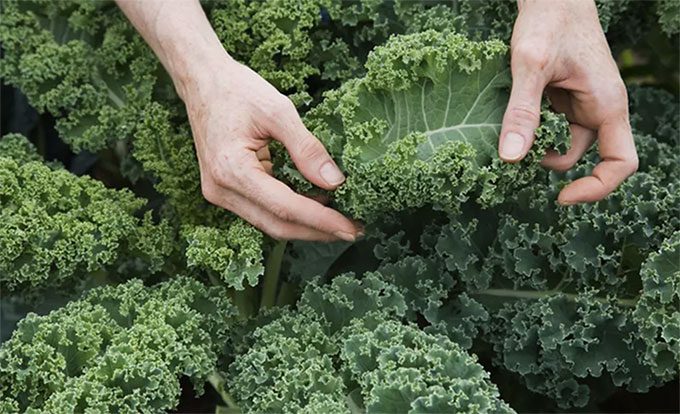According to experts, kale is dubbed a “superfood” due to its rich nutrient content and ability to prevent many life-threatening diseases.
Benefits of Kale
Kale is a leafy green vegetable belonging to the cabbage family, characterized by its dark green or purple leaves. It is packed with various types of fiber, vitamins, minerals, and beneficial plant compounds such as glucosinolates, antioxidants, lutein, and zeaxanthin.
Additionally, the abundant phytochemicals (plant chemicals with medicinal effects) found in kale contribute to its status as a nutrient-dense food that is low in calories and starch-free.
Some studies have shown that purple kale varieties contain anthocyanins, a natural organic compound that helps improve cardiovascular health.

Kale – (Image: GETTY IMAGES).
Diabetes
According to a publication in the Journal of Diabetes Investigation, consuming a diet rich in fruits (especially berries), leafy greens, yellow vegetables, and cruciferous vegetables can significantly reduce the risk of developing type 2 diabetes.
Heart Disease
The nutrients found in kale support cardiovascular health, particularly glucosinolates, a group of plant compounds that provide antioxidant and anti-inflammatory benefits.
Kale is also very high in potassium, an essential electrolyte that helps control blood pressure by enhancing sodium excretion.
Cancer
The American Institute for Cancer Research recommends that people eat kale regularly because it is rich in antioxidants (including carotenoids and vitamin C), which help reduce cancer promotion.
Many other studies have also shown that daily consumption of leafy greens helps lower the risk of cancer, particularly colorectal cancer.
Positive Impact on Bone Metabolism
The vitamin K and plant-based calcium content in kale helps strengthen bones and positively affects bone metabolism (formation, remodeling, and resorption).
Most calcium minerals in leafy green vegetables are not absorbed by the human body, but kale is an exception.
Additionally, the vitamin K found in this plant plays an important role in the blood clotting process.
Digestive Health
The adequate amount of fiber and water in kale helps prevent and treat constipation while keeping the intestines functioning well. The fiber in kale also helps increase waste bulk.
Kale contains prebiotics, a key component that contributes to the body’s microbiome.
Skin and Hair
Kale is rich in water-soluble vitamin C and beta-carotene (a precursor to vitamin A), both of which are nutrients that promote healthy skin and hair.
Moreover, vitamin C plays a vital role in supporting the immune system, repairing cells, and slowing down the aging process.
Eye Health
Kale is loaded with nutrients beneficial for eye health, such as vitamin C, vitamin E, carotenoids (lutein, zeaxanthin, beta-carotene), zinc, and omega-3 fatty acids, all of which are crucial for vision due to their anti-inflammatory and antioxidant functions.
Who Should Avoid Kale?
Despite its many health benefits, kale is not suitable for everyone. This “superfood” is not recommended for individuals with the following health issues:
- Those on blood-thinning medications need to monitor their vitamin K intake closely. Since kale is high in this vitamin, it may be difficult for consumers to ensure an appropriate intake.
- Individuals with iodine deficiency should also avoid kale as it contains goitrogens, which are anti-nutrients that can hinder iodine absorption by the thyroid gland.
Growing Kale in Styrofoam Boxes at Home


















































